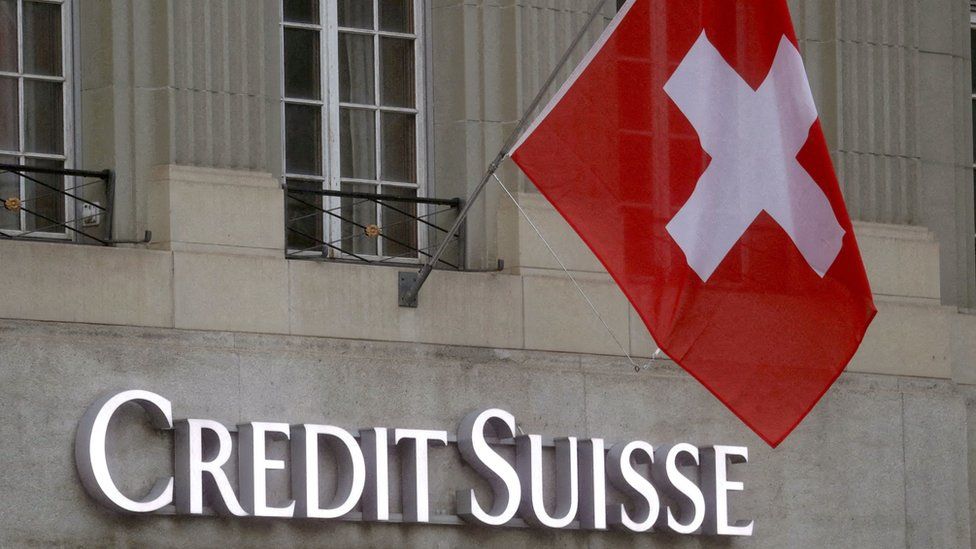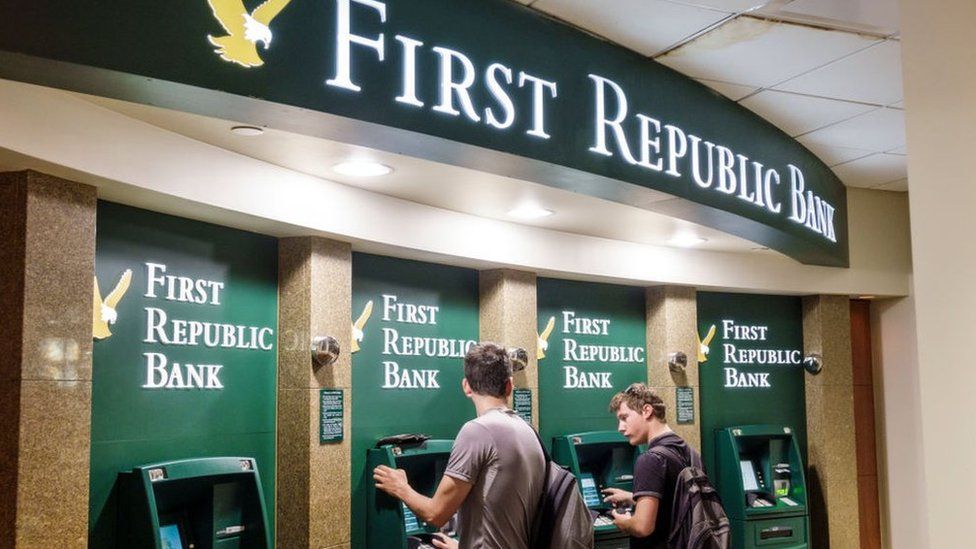Investors are selling shares despite an overnight rescue deal for America’s First Republic.
 Image source, Reuters
Image source, ReutersCredit Suisse’s share price has fallen by more than 10% and stocks markets have edged lower despite attempts to calm fears about a crisis in the banking sector.
The troubled Swiss lender had secured a £45bn lifeline from the country’s central bank.
However, after a brief rise, its shares fell back while markets across the UK and Europe turned negative.
Major US indexes fell, amid fears of more trouble.
On Thursday, a group of Wall Street giants injected $30bn (£24.8bn) into First Republic, a smaller domestic bank seen as at risk of failure following the collapse of two other mid-sized US banks in recent days.
The rescue by the group of 11 banks including JP Morgan and Citigroup had appeared to calm stock markets. In Asia, Japan’s Nikkei share index closed 1.2% higher.
But shares in First Republic fell 25% on Friday after the bank said its was suspending its dividend – its payment to shareholders – “during this period of uncertainty”.
Stock markets in the UK, France and Germany all opened higher on Friday but have since fallen.
In New York, the Dow Jones Industrial Average index dropped 1.2%. The Nasdaq and the S&P 500 indexes were also trading lower.
Meanwhile, a sell-off in Credit Suisse shares has gathered pace.
Shares in Credit Suisse sank earlier in the week on concerns over its future, before the Swiss National Bank said stepped in with emergency funds.
Credit Suisse – which employs about 50,000 people worldwide, with around 5,000 in London – has been troubled for a long time and continues to be loss-making.
Earlier this week, it rattled investors when it admitted that it had found “material weakness” in its financial reporting, while its biggest shareholder – the Saudi National Bank – said it could not inject further funds into the Swiss lender.
Since then, $466m has left Credit Suisse’s European and US managed funds, according to data from financial services firm Morningstar.
The issues at Credit Suisse coincided with the failure of two lenders in the US – Silicon Valley Bank (SVB) and Signature Bank – raising fears over the health of the banking system.
Johann Scholtz, banking expert at Morningstar, said: “We believe that the collapse of Silicon Valley Bank, the comments from the Saudi National Bank that they would not provide more capital to Credit Suisse, Credit Suisse’s longstanding challenges, plus possibly the financial reporting issues, all contributed to clients and financial advisers losing confidence in Credit Suisse.
“These combined created a perfect storm.”
On Friday, SVB Financial Group – the parent group for Silicon Valley Bank – filed for bankruptcy protection to enable it to sell off its remaining assets.
US regulators stepped in at the weekend to ensure that customers at SVB and Signature Bank had full access to their money.
Days later, concerns emerged that San Francisco-based First Republic would be the next bank at risk of a rush of customers withdrawing their deposits.
It shares had sunk by nearly 70% over the last week.
The 11 US banks who announced the support said the action reflected their “confidence in the country’s banking system”.
US financial officials said the move was “most welcome, and demonstrates the resilience of the banking system”.

Image source, Getty Images
Morningstar analysts Niklas Kammer and Johann Scholtz said they believed the problems at Credit Suisse were “idiosyncratic in nature and we believe containable for now even in a worst-case scenario”.
However, they added that “developments are currently happening at a rapid pace and views we form today may be stale tomorrow”.
Central banks around the world have sharply raised borrowing costs over the past year to try to curb the pace of overall price rises, or inflation.
The moves have hurt the values of the large portfolios of bonds bought by banks when rates were lower, a change that contributed to the collapse of Silicon Valley Bank, and has raised questions about whether other firms are facing similar situation.
Jeffrey Cleveland, chief economist at US asset manager Payden and Regal, said other banks could be caught up in the problem.
“There could be other vulnerabilities… if central banks are intent on continuing to raise interest rates,” he told the BBC’s Today programme.
“Historically when that happens we do see fragility, we do see problems in the financial system.”
Before the turbulence in the banking sector erupted, both the US Federal Reserve and the Bank of England had been expected to raise interest rates further at meetings next week. However, due to recent events, some have speculated these rate rises might be scaled back or even scrapped.
On Thursday, the ECB announced a further increase to interest rates from 2.5% to 3%.